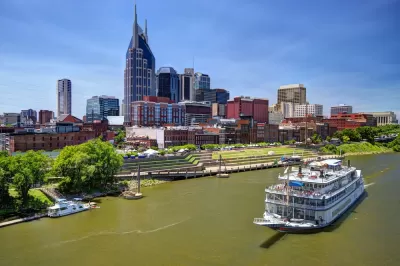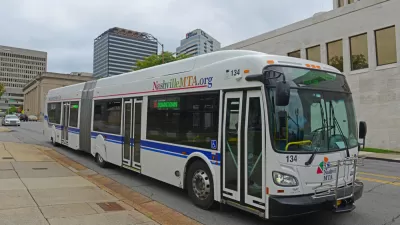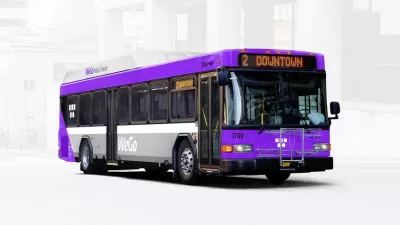The Nashville Metropolitan Transit Authority and the Regional Transportation Authority of Middle Tennessee adopted the most comprehensive and expansive version of the nMotion plan. Now they have to fund all those big ideas.

Joey Garrison digs into "the most crucial, yet elusive, question that could determine whether Middle Tennessee will build a new regional transit system any time soon."
The Nashville Metropolitan Transit Authority and the Regional Transportation Authority of Middle Tennessee announced the 25-year nMotion regional transit plan in August, and now the Nashville Area Chamber of Commerce is leading the effort to figure out how to pay for the $5.97 billion price tag to build out the plan's ambitions.
So far, the chamber's Moving Forward initiative as identified seven funding possibilities, and called for further study of each of them. "Ideas for transit funding are from sales taxes, property taxes, wheel taxes, tourist services taxes, parking taxes, local gasoline taxes and land value capture taxes," according to Garrison.
The chamber is aware, however, that many of those ideas would face stiff political resistance. "In fact, five of the seven ideas — including a local sales tax dedicated solely for transit, a local gas tax and a land value capture tax — would hinge on enabling legislation from the Republican-controlled Tennessee General Assembly, which has shown strong resistance to tax increases of any kind in recent years."
The article, however, begins the work of examining each of the proposed ideas, which are all very speculative at this point, but at least they are already available for the public to consider.
FULL STORY: How to pay for a $6B transit plan? Nashville chamber floats 7 ideas

Planetizen Federal Action Tracker
A weekly monitor of how Trump’s orders and actions are impacting planners and planning in America.

Maui's Vacation Rental Debate Turns Ugly
Verbal attacks, misinformation campaigns and fistfights plague a high-stakes debate to convert thousands of vacation rentals into long-term housing.

Restaurant Patios Were a Pandemic Win — Why Were They so Hard to Keep?
Social distancing requirements and changes in travel patterns prompted cities to pilot new uses for street and sidewalk space. Then it got complicated.

In California Battle of Housing vs. Environment, Housing Just Won
A new state law significantly limits the power of CEQA, an environmental review law that served as a powerful tool for blocking new development.

Boulder Eliminates Parking Minimums Citywide
Officials estimate the cost of building a single underground parking space at up to $100,000.

Orange County, Florida Adopts Largest US “Sprawl Repair” Code
The ‘Orange Code’ seeks to rectify decades of sprawl-inducing, car-oriented development.
Urban Design for Planners 1: Software Tools
This six-course series explores essential urban design concepts using open source software and equips planners with the tools they need to participate fully in the urban design process.
Planning for Universal Design
Learn the tools for implementing Universal Design in planning regulations.
Heyer Gruel & Associates PA
JM Goldson LLC
Custer County Colorado
City of Camden Redevelopment Agency
City of Astoria
Transportation Research & Education Center (TREC) at Portland State University
Jefferson Parish Government
Camden Redevelopment Agency
City of Claremont





























